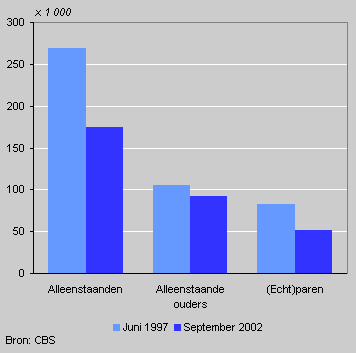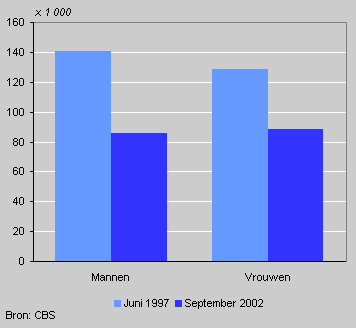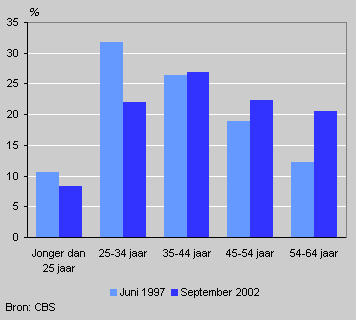Income support benefits up again after five years of decrease

In October 2002 the number of people in the Netherlands claiming income support rose again for the first time in five years. The number grew by more than a thousand to 318 thousand. This puts the turning point for income support benefit three-quarters of a year later than that for unemployment benefit.
The number of claims for income support had fallen continually since June 1997. The decrease among single parents was relatively small.
142 thousand fewer households on income support
Between June 1997 and September 2002 fewer and fewer people depended on income support to get by. In this period the number of income support benefits dropped by 142 thousand to 317 thousand. In September 2002, 3.1 percent of the population aged 18-64 years received income support.
Income support by household composition

Decrease equally large for couples and single people
Couples and single people accounted for ninety percent of the decrease between June 1997 and September 2002. The decrease was about equal for both groups: 38 percent fewer couples and 35 percent fewer singles received income support.
Single parents benefited less
The number of benefits for single parents fell by only 13 percent. The number of claims in this group is affected less by the economic situation and more by personal circumstances, especially tasks in the area of childcare.
Income support for singles by sex

Faster fall for single men
Among single people the decrease among men was larger than that among women. In June 1997 the number of income support benefits paid to men was 12 thousand higher than the number of paid to women. In September 2002 the number of single women receiving income support was higher, by 4 thousand.
Income support by age

Income support claimants ageing
The group receiving income support aged in the period June 1997 to September 2002. The share of income support benefits received by 45-64 year-olds rose from 31 to 43 percent, while the share for the group aged under 35 years dropped from 42 to 30 percent.
Henk Amptmeijer